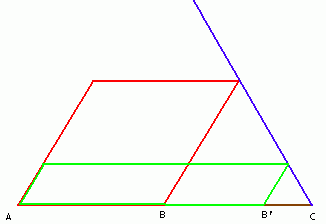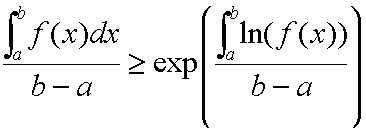
Well, it's november, and I here is the first of those neat things I wanted to
celebrate on this page. It may look like a bunch of different theorems, but in
fact they are all the same, only the language and "mindset" are different. The
first version, and by far the oldest is the statement that in the diagram below

The second version, which looks like


None of these theorems by themselves is reall terribly interesting, but as a
set they are amazingly similar. This is where the beauty comes in.
translate the parallograms' sides and area into algebraic variables. the assertion reduces to the simplest case of (2). Next, let the function in (3) look like a bunch of steps, each 1 unit long in terms of x, and the height of each step is whatever you like(provided it's positive). again, the expression reduces to (2)! You can go the other way, and take the limit of (2) as n goes to infinity, and you will get (3). Again, Euclid's proof of (1) can be used as a model for the proof of the algebraic version, and this algebraic version is actually required for proving (2). Everything is the same!
any way, that's my theorem for this month. I will be setting up the proofs shortly.